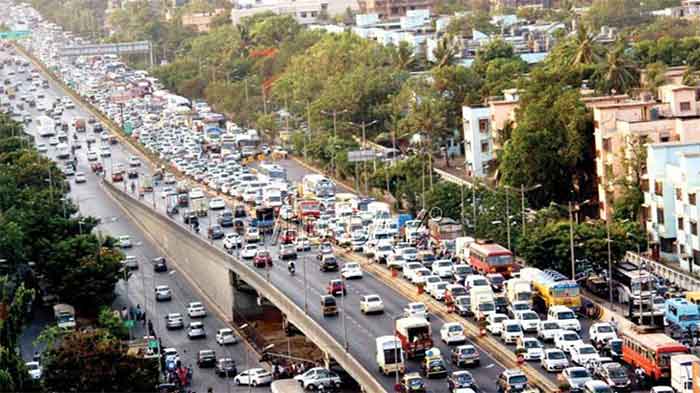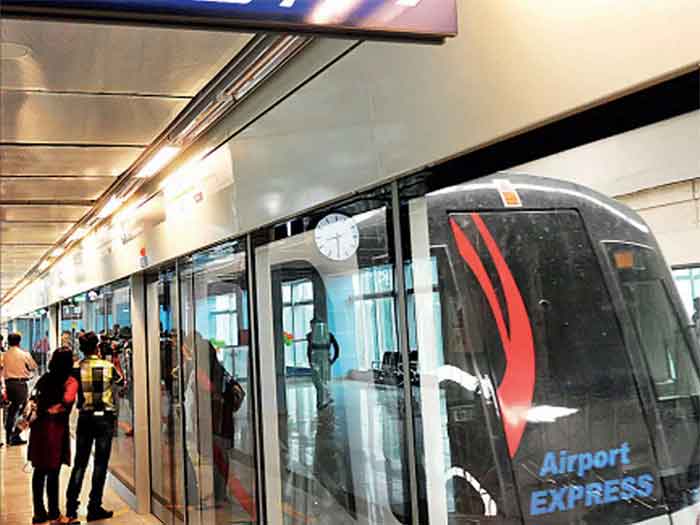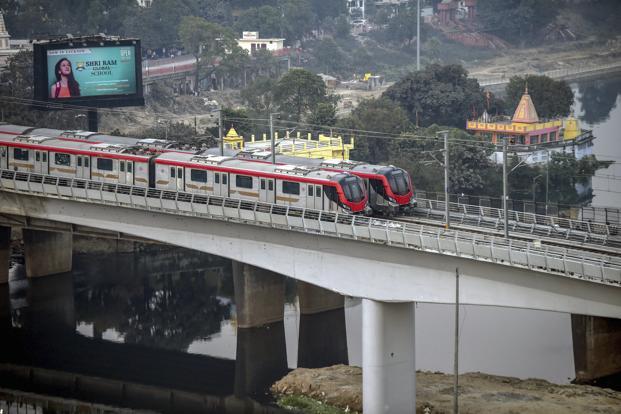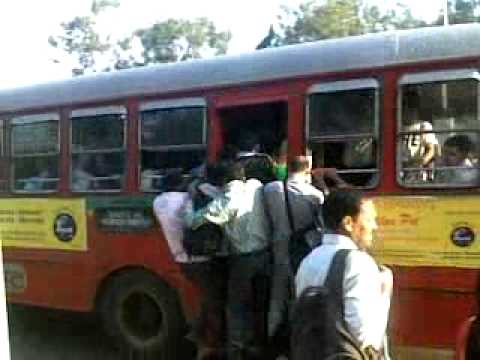
Mr R.C. Bhargava, the high profile chairman of Maruti Suzuki, and the likes of him owe an explanation to the public for the situation so visible in many places in the country.
There is a blatant encroachment by the motor car showroom on the footpath as well as the prominent artery S.V. Road in Bandra in Mumbai. And a serious threat of injury and death to pedestrians. Vehicles are parked on the road and then the Metro rail network has blocked most of the road as a further assault on walkers. Of course no apology for the inconvenience.This is the Maruti Suzuki showroom for you. There are similar scenes everwhere. Nagpur’s police commissioner Amitesh Kumar noticed such violations in that city too during a recent inspection.
Mr Bhargava comes into the picture for another reason. He has been tirelessly arguing of late for further penetration of motor cars in India and laments that this (many would call it an assault) is very inadequate. He says it will take India another 140 years to reach the levels of car use in China.
Since he was also a senior civil service bureaucrat he owes a responsibility to common people, not just the corporate world. Do people like him realise that the expansion of the car industry is taking place at the expense of common people, taking way their road space, reducing their public transport space and other facilities ?
It is amazing that people like him have seldom argued for bridging the wide gap between other countries and India in terms of public transport facilities for pedestrians, cyclists and buses.
We are also way behind the developed world in crusaders exposing the rampant misdeed of the auto industry. In the U.S. Ralph Nader has been working on this for more than half a century and they did everything to blackmail, even kill him.
Mr Bhargava was recently described by an auto industry publication as a Lone Ranger. What an irony some critics see this fiction hero as one rationalising colonialism, denying the contribution of indigenous people and legitimising capitalism.
Mr Bhargava complains about high taxation on motor cars.so he wants to subsidise the rich at the cost of ordinary people.
It is the buses which are actually heavily taxed. Even the road transport committee says that. Presently acquisition cost of a bus is compounded by the existence of multiple commodity taxation, viz, central excise and State VAT/Sales Tax. In view of the advantages of public bus transport system it would be desirable to lessen the burden of commodity taxation. In addition, public buses (Contract/Stage carriage) are subject to Motor Vehicle Tax (MVT) and Passenger tax etc. which also need to be rationalized. There is heavy and varying incidence of MVT on public buses, in general, and SRTUs, in particular. SRTUs in Maharastra and Gujarat contribute 17% of their respective turnover towards MVT
The motor car per se is not the problem. It is the rampant promotion without any safeguards for the victimised public that is the problem. This assault is already so visible in Metro cities and the menace will soon spread to other towns because of the misguided, extremely callous policies of the establishment.
As for the showroom in Bandra , I politely asked the chief there about the take over of the public footpath and the road and he mumbled a few words. At least he was not rude. That is some consolation.
In other countries the automobile establishment at least has some conscience, at least lip sympathy is paid to public transport. In India it is a shame that the share of buses and trucks in the vehicle population at about 1 per cent and 5 per cent respectively is much lower compared to most of the other countries in Asia
Indiscriminate parking of trucks on highways and on carriageways of towns and cities encroaches upon space reserved for pedestrians, as well as for moving vehicles. Truck terminals/Transport Nagars need to be constructed outside the cities to ensure availability sufficient parking space to trucks. This would free the highway and carriageway space that is as of now encroached upon by parked trucks and promote free flow of vehicles on highways, the committee noted.
New electronic tolling systems make more complex time-sensitive applications easier. This can take the form of road tolls, congestion pricing, cordon fees, high-occupancy vehicle lanes, vehicle use fees and road-space rationing. Since charges are based on usage, those who contribute more to the congestion pay more and those who use the roads less frequently or who travel during non peak hours will pay less or need not pay at all. The National Urban Transport Policy outlines the directions in this regard for urban spaces.
Even small countries, cities are doing very good improvements with road traffic, public transport.What a delightful ride in Dar e Salaam’s BRT, I am told I am one of the 200,000 daily commuters on this 21 km stretch (to extend to 105 km soon)! Disciplined queue. Incredible frequency (bus arrives every 3-4 minutes)!!! Enjoyable and comfortable ride along the vibrant and spacious sidewalks…. Making of a sensible and liveable city, said Anumita Roy Chaudhuri, a traffic expert from Delhi after a visit to the city.
In contrast to Mr R.C. Bhargava look at the fresh and pro people thinking of another Bhargava, Rajeev Bhargava, political theorist. That is about the bicycle and Indian democracy.
He said in a recent article in the Hindu.Let’s take a simple example. A village has a bicycle to fetch goods of daily use. So far, the cycle is used exclusively by the Pradhan, to procure goods only for himself and his family; but now, following a change of heart or popular pressure, the Pradhan also uses the bicycle to ferry goods he thinks would meet the basic needs of other village folks. The cycle is now used, at least some times, also for the people. On receiving some articles of subsistence, they begin hoping that a day will come when they would be able to ride the cycle, see, touch, smell the goods themselves and choose what they really want. Instead of being content with things handed out to them, they can now go to the market, see the entire range of goods on display and decide what, by their own reckoning, best satisfies them. So, they somehow manage to persuade the Pradhan to let them ride the bicycle and visit the market. They now realise that there were many things that they had not even conceived they needed. They also begin to enjoy the ride to the market and back. Indeed, the cycle takes them to entirely new worlds, beyond the market, beyond the immediate world of things they need. It fires up their imagination, helps them forge new relations, conjure up new worlds. Riding the cycle has its own rewards, its own thrill. The bicycle now doesn’t merely work for them, but is also worked by them and for that reason works even better.
At this stage, however, the Pradhan changes his mind and takes this cycle away from them; and the village is back to square one — the people return to their deprived state. In a fix, the poor villagers realise that the mere opportunity to use the cycle was never enough. It should always have belonged to them. They should have claimed it as theirs, have had a greater stake in it. They, and not the Pradhan, should have collectively owned it because, in the last instance, its use depended on their having a permanent, inalienable right to it. So now they strive to make the cycle theirs, to prevent it remaining an exclusive possession of the Pradhan. They realise that they should not even view the cycle as a thing of mere use, with an instrumental value. Rather, it should always have been something of intrinsic value, indeed an integral part of who they are. Losing it would not just be a temporary deprivation from which they can recover easily and quickly by getting a replacement, but the alienation of a basic capacity to determine the course of their life, a shattering blow to their self-confidence and self-esteem, to their very sense of self. Once they reclaim it, they can legitimately say that the cycle not only functions for them, is run by them, but also belongs to them. It is theirs; for them, by them, and even more importantly perhaps, of them.
I hope the reader has understood that what is true of a simple bicycle is also true of the far more complex practice of democracy. Democracy is an institutional mechanism which helps us obtain resources that potentially satisfy us, enable us to lead the life we wish and choose. But it works for us only if we all take part in running it. If we allow some elites (the Pradhans) to take charge, rely exclusively on them to get us the resources that we need, the chances are that we may never get the resources, or receive them sporadically, dependent on the elites’ whims and fancies. Besides, we would be deprived of the sheer pleasure of decision-making, of taking an active part in choosing and allocating resources, of determining the course of our collective and individual lives. And, finally, if we don’t have a stake in democracy, if we feel we don’t own it, don’t see it as belonging to us, as a constitutive part of our identity, then one day it might even be taken away from us; hijacked from right under our nose by someone. So, we must ensure that democracy is not just for the people, is run by the people but also is of the people. It belongs to us; that is to say, it is ours . A lot of thought, it appears, was invested by Lincoln in this short, by now clichéd, phrase.
People like Mr R.C. Bhargava need to think a lot if we are to improve our traffic, transport system.
Vidyadha Date is senior journalist and author of a book in public transport

















































